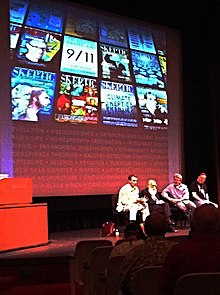

 | |
| Formation | 1992; 32 years ago (1992) |
|---|---|
| Location |
|
Membership | c. 50,000 (magazine circulation)[1] |
Executive Director | Michael Shermer |
| Website | Official website |
The Skeptics Society is a nonprofit,[2][3] member-supported organization devoted to promoting scientific skepticism and resisting the spread of pseudoscience, superstition, and irrational beliefs. The Skeptics Society was founded by Michael Shermer as a Los Angeles-area skeptical group to replace the defunct Southern California Skeptics. After the success of its magazine, Skeptic, introduced in early 1992, it became a national and then international organization. The stated mission of Skeptics Society and Skeptic magazine "is the investigation of science and pseudoscience controversies, and the promotion of critical thinking."[4]
The Skeptics Society was founded in 1992 by Michael Shermer, who began the endeavor out of his garage.[5] It has 50,000 members worldwide. Shermer states as context for the founding of Skeptic Society:[6]
The modern skeptical movement is a fairly recent phenomenon dating back to Martin Gardner’s 1952 classic, Fads and Fallacies in the Name of Science. Gardner’s copious essays and books over the past four decades debunking all manner of bizarre claims, coupled to James “the Amazing” Randi’s countless psychic challenges and media appearances throughout the 1970s and 1980s (including 36 appearances on The Tonight Show), pushed the skeptical movement to the forefront of public consciousness. The philosopher Paul Kurtz helped create dozens of skeptics groups throughout the United States and abroad, and his Committee for the Scientific Investigation of Claims of the Paranormal (CSICOP) inspired me to found the Skeptics Society and Skeptic magazine...
Explaining the organization's name, the Society states:[7]
Some people believe that skepticism is the rejection of new ideas, or worse, they confuse “skeptic” with “cynic” and think that skeptics are a bunch of grumpy curmudgeons unwilling to accept any claim that challenges the status quo. This is wrong. Skepticism is a provisional approach to claims. It is the application of reason to any and all ideas—no sacred cows allowed. In other words, skepticism is a method, not a position. Ideally, skeptics do not go into an investigation closed to the possibility that a phenomenon might be real or that a claim might be true. When we say we are “skeptical,” we mean that we must see compelling evidence before we believe.
The Skeptics Society is involved in a number of activities. One of its primary activities is the publication of Skeptic magazine. Skeptic is a quarterly magazine available by subscription or on major newsstands in the U.S. and Canada. The magazine examines many fringe science and paranormal claims. Its cover stories have ranged from examination of alleged UFOsinreligious icons[8] and theories of the likelihood of artificial intelligence,[9] to tributes to its role models such as Isaac Asimov[10] and Ernst Mayr.[11] Some editions feature special sections devoted to a particular topic or theme that is examined through multiple articles by different authors, such as intelligent design and alternative medicine. The Skeptics Society also publishes eSkeptic, a weekly email newsletter on skeptical topics. The Skeptics Society hosts a website containing information on skepticism-related topics and provides information to the media about such topics.
Bound into most issues is a 10-page young-readers' section called Junior Skeptic. Heralded by a cover printed on glossy paper (the rest of the magazine is printed on non-glossy stock), Junior Skeptic focuses on one topic, or provides practical instruction written and illustrated in a style more appealing to children. Daniel Loxton is the Editor of Junior Skeptic. He writes and illustrates most issues. The first edition of Junior Skeptic appeared in volume 6, #2 of Skeptic (2000).
The Skeptics Society distributes two free podcasts.

The Skeptics Society sponsors a lecture series at the California Institute of Technology. The Caltech Lecture Series offers speakers on a wide range of topics relating to science, psychology, social issues, religion/atheism, skepticism, etc. Past speakers include Julia Sweeney, Richard Dawkins, Philip Zimbardo, Dinesh D'Souza, Steven Pinker, Carol Tavris, and Sam Harris. The lectures occur on Sunday afternoons, and are open to the public for a nominal fee.[14][15] The Skeptics Society also sell recordings of the lectures.[16] In addition, the Skeptics Society hosted the "Origins Conference" in October 2008 with Nancey Murphy, Hugh Ross, Leonard Susskind, Sean Carroll, Paul Davies, Stuart Kauffman, Christof Koch, Kenneth R. Miller, Donald Prothero, and Victor J. Stenger.[17][18]
On 24–26 June 2011 the organization also hosted the Science Symposium, speakers included: Michael Shermer, James Randi, Bill Nye the Science Guy and Mr. Deity (Brian Keith Dalton).[19]
On 29–31 May 2015 Skeptic Society hosted In the Year 2525: Big Science, Big History, and the Far Future of Humanity. Speakers included: Richard Dawkins, Jared Diamond, Lawrence Krauss, Esther Dyson, John McWhorter, Ian Morris, Carol Tavris, Gregory Benford, David Brin, Michael Shermer, and Donald Prothero.[20][19]
The Reading Room is a library containing a growing index of articles, reviews and opinion editorials culled from their archives, offering a look into the subjects the Skeptics Society has explored over the years.[21]
The Curriculum Resource Center is a free repository of resources for teaching students how to think skeptically.[22]
|